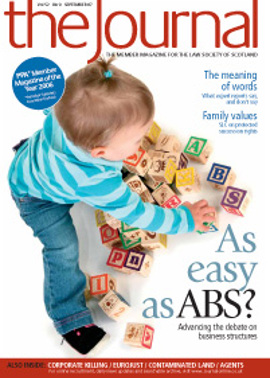Duties to the court

Professional duties: diets
In McDonald-Grant v Sutherland & Co [2007] CSIH 54; 2007 GWD 21-351 the appellant’s agents were criticised for failing to take reasonable care to avoid court time being wasted. They failed to advise that the appeal would not proceed as soon as they had become aware that this was the situation. As a result, an appeal diet was assigned which could have been used for other business. Apart from avoiding the discomfort of being criticised by the Inner House, the lesson to all from this decision is to remember that court resources are finite. When a diet is assigned to litigants, it inevitably means that other litigants have to wait. If litigants subsequently have no need for the diet, the court should be advised so that other business may be able to be programmed.
Perhaps the most practical lesson to be taken from this decision is simply that once a diet is assigned, litigants should not assume that any joint or unopposed motion to discharge will be granted for a reason which suits the parties/agents. The court can decide that that is the diet which the parties have been assigned and they will proceed on that date. Courts are not run for the sole convenience of litigants in any particular action. The effect of such a culture is chaotic for the fair administration of justice for all litigants.
Remit to the sheriff court
In Paterson v Advocate General [2007] CSOH 112; 2007 GWD 24-391 Lord Hodge refused a motion to remit a reparation action for £5,000 to the sheriff court. The value of a cause and its apparent simplicity were not in themselves sufficient to justify a remit in light of the decision of McIntosh v BRB (No 2) 1990 SLT 641. A possible earlier proof date in the sheriff court likewise was not sufficiently crucial to justify the remit. Leave to reclaim was granted and there may be developments on this front.
Caution for expenses
In Albert Bartlett and Sons (Airdrie) Ltd v Gilchrist and Lynn Ltd [2007] CSOH 140; 3 August 2007, the first third party enrolled a motion for the defenders to find caution for expenses, the defenders having convened them as a party. The motion was enrolled in terms of s 726(2) of the Companies Act 1985. Lord Uist rejected a preliminary submission that the motion was incompetent, the submission being that the statute referred to pursuer and defender and thus did not cover the present circumstances. The statutory provision should not be construed strictly. It was illogical to interpret the provision in such a manner when the first third party could simply have enrolled a motion at common law. The fact that the action could be sisted pending caution being found was not significant as any party could oppose the sisting of the action. Further, if the action was sisted, the sist could be recalled. Finally in many situations in which a third party was convened, it would have been open to the defender to raise a separate action. It was illogical that a motion in terms of the section could be made in a separate action but not in the action in which the defender convened the third party. Lord Uist further observed that if caution was ordered under the statute, the terms of the provision envisaged that the action should normally be sisted.
Amendment: relevancy
In PS Independent Trustees Ltd v Kershaw [2007] CSOH 122, Lord Glennie, in considering whether to allow a minute of amendment to be received, noted that at that stage it was perfectly proper to consider the issue of relevancy of the amendment. There was little point in parties incurring further expense if the amendment did not address the criticisms of the pleadings. However, such an amendment would be rejected only if it was clear that the proposed amendment would not cure the defect. Otherwise, it was appropriate to receive the minute of amendment. Receipt did not preclude argument on issues of relevance when the motion was made to open the record in terms of the amendment, or indeed thereafter at a further debate.
Recalling decree of divorce
In Mahmood v Mahmood 2007 GWD 23-383 the defender had failed to lodge a notice of intention to defend in a divorce action and as a result the pursuer was able to obtain decree of divorce. The defender appealed the decree, claiming that she had a good claim for financial provision. Sheriff Principal Dunlop refused the appeal. There was no provision in the sheriff court to recall a decree in such circumstances. Decree in this case was not analogous to decree being granted by default, in which the decision to grant decree was discretionary. In the present instance, the sheriff had simply applied the law in determining that decree should be granted.
Four cases on expenses
In Bell v Inkersall Investments Ltd [2007] CSIH 60; 2007 SLT 737 the operation of reg 18 of the Civil Legal Aid (Scotland) Regulations 2002 was examined. The pursuer sought modification of any award of expenses made in respect of stages in a litigation in which he had reg 18 cover, a legal aid certificate subsequently being granted in his favour. The Inner House decided that an assisted person had the power to seek modification of any adverse awards of expenses made in respect of stages in a litigation for which cover was available by the operation of reg 18. In this case, taking account of the pursuer’s conduct of the litigation, the benefits he gained and the losses suffered by the defenders, and the pursuer’s apparent means, the Inner House refused the modification. Expenses were awarded on an agent and client, client paying basis.
In Mackenzie v Grant 2007 GWD 25-433, in assessing the importance of the cause to a litigant for the purposes of an additional fee, Sheriff Principal Young considered that this could be decided subjectively by reference to the particular litigant.
In APC Ltd v Amey Construction Ltd [2007] CSOH 129; 2007 GWD 24-402 the issue arose as to whether an expert could be certified. The individual had been present in court during the debate and at subsequent hearings. The expert had further prepared and revised a document used by both sides during submission. This motion was refused, as certification for such a person was restricted to carrying out investigations to qualify a person to give evidence and no evidence had been led as yet in the litigation.
In Reid v Sundolitt Ltd [2007] CSIH 64; 27 July 2007, an Extra Division of the Inner House, in considering whether certification of the cause as suitable for the employment of junior counsel should have been granted in an action in the sheriff court, observed that factors to be considered were not simply those live at the commencement of a proof. The assessment had to be made by reference to when counsel was first instructed. In this action complex issues relating to quantum had at that time been live as well as issues of liability. Further the sum involved was substantial. Certification was appropriate.
Proof of insolvency
In Macplant Services Ltd v Contract Lifting Services (Scotland) Ltd 2007 GWD 22-373, an action for the winding up of a company, a proof had been allowed. This decision was appealed. Sheriff Principal Young concluded that a statement of account and accompanying invoices, which had not been paid, queried, or disputed, confirmed the debtor’s liability. An affidavit from a manager in the provisional liquidator’s firm confirmed the position regarding the invoices. It further confirmed that there was no prospect of the company paying their liability. The affidavit also indicated that there was no option available other than liquidation. In addition, there was a letter from the debtor offering to pay by instalments, together with two statements of affairs, one prepared by a director of the debtor and the other by the provisional liquidator. All these documents indicated that the debtor was insolvent. Sheriff Principal Young granted the winding up order. Even if a proof was competent, in light of the information available the sheriff had been in error in allowing a proof.
The usual caveat applies.
In this issue
- TUPE: stay your hand
- Nothing new under the sun
- ABS - Actual Benefit Soon?
- A chance to succeed?
- Killing in company
- Longer arm of the law
- Agents... a commercial view
- Bad language
- Remote gambling - all bets off?
- What makes a team?
- Managing the fraud risk
- Duties to the court
- Copycats: another nine lives?
- Activity in the courts
- Invoking the UCCJEA
- The men in black
- Scottish Solicitors' Discipline Tribunal
- Website reviews
- Book reviews
- Big names, big issues for annual conference
- Meet the Committee: Cameron Ritchie
- Contaminated land - where are we now?






